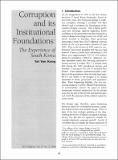| dc.contributor.author | Kong, Tat Yan | en |
| dc.date.accessioned | 2016-02-24T15:56:40Z | |
| dc.date.available | 2016-02-24T15:56:40Z | |
| dc.date.issued | 01/04/1996 | en |
| dc.identifier.citation | Kong, T., Y. (1996) Corruption and its Institutional Foundations: The Experience of South Korea. IDS Bulletin 27(2): 48-55 | en |
| dc.identifier.issn | 1759-5436 | en |
| dc.identifier.uri | https://opendocs.ids.ac.uk/opendocs/handle/20.500.12413/9241 | |
| dc.description.abstract | Summary In spite of the reformist rhetoric of South Korea's first post?military administration inaugurated in 1993, the institutional foundations of corruption remain intact ? the government?big business relationship in which donations are exchanged for favourable official consideration of the business sector. Recent measures to accelerate economic liberalization have strengthened the bargaining power of the business sector in relation to the government rather than replacing collusion with competition. The absence of countervailing power to the government?business nexus and the current conservative political agenda reflect the incomplete nature of the democratic transition since 1987 and contribute to the persistence of corruption. | en |
| dc.format.extent | 8 | en |
| dc.publisher | Institute of Development Studies | en |
| dc.relation.ispartofseries | IDS Bulletin Vol. 27 Nos. 2 | en |
| dc.rights.uri | http://www.ids.ac.uk/files/dmfile/IDSOpenDocsStandardTermsOfUse.pdf | en |
| dc.title | Corruption and its Institutional Foundations: The Experience of South Korea | en |
| dc.type | Article | en |
| dc.rights.holder | © 1996 Institue of Development Studies | en |
| dc.identifier.doi | 10.1111/j.1759-5436.1996.mp27002007.x | en |

